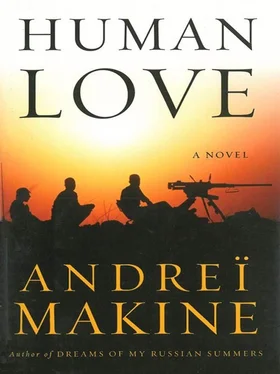Tales of men and women, and yet at no time, I tell myself in perplexity, does love appear, plain love, with its insane generosity, its spirit of self-sacrifice. Here the talk is of prénuptial bargaining, long marriage rituals, and a whole commerce of paid-for couplings and bride prices, even virginity being rewarded with a goat…
A memory comes back to me, the tale of a man tortured with the strappado , deprived of food and water, who told me he would have accepted that suffering all over again in order to find himself for a moment beside the woman he loved.
The notion of talking about him here, in this hall, suddenly seems to me urgent and vital. And completely unthinkable. For what is taking place here is a well-rehearsed performance in which everyone plays his role: the cantankerous “traditionalists” talking of slavery, the smiling “moderns” exalting sexual négritude, the enthusiastic audience, the condescending notabilities. This is playacting, true to its illusory nature: the show being staged has no connection with the life unfolding beyond these walls.
Beyond these walls, a few hours away from Conakry, lie two countries in their death throes, Sierra Leone and Liberia, peopled with ghosts forever at one another’s throats on soil crammed with gold and diamonds. Land where more mines are planted than crops. The playacting makes it possible to forget this for as long as the show lasts. The intellectuals perform their verbal pirouettes, the leaders signal their approval by puffing up their greasy chops, the audience relishes the spicy witticisms (“Africa is an afrodisiac!” yells the Togolese writer). The organizer with her beet-colored hair fidgets slightly on her chair, impatient to be mounted again by her Congolese friend. And at this very moment in a Liberian village a woman is being raped, a child’s arm is being cut off. This is no mere probability. It is a statistical certainty.
The man gazing at the constellation of the Wolf was no dreamer. Quite simply, he knew that the viewpoint of the stars made it possible to tear down the walls behind which human beings hide for the satisfaction of remaining blind.
As I study the hall, I reflect that it was this world here, this masquerade, that Elias detested the most. A world of which, at this moment, I am a part.
During the last days we spent in the furnace of Mogadishu, he must have understood perfectly that he was henceforth “beyond redemption”: useless now to the Soviets, who were making their catastrophic exit, but above all, undesirable in his native Angola. For more than a week I did not see him, even in the distance, and I was comforted by this: I dreaded hearing him talk about the hopelessness of his situation. Not having seen him, I hoped he had succeeded in leaving Mogadishu by his own means. I remembered the thought that had crossed my mind from time to time in the past: Why did he not give up all these increasingly absurd games of war and espionage and settle somewhere in the West? In truth, I still did not understand what Anna meant to him. Years later that handful of words he had exchanged with her in Moscow would come back to me: “To go back… Back to Sarma…”
***
A new outburst of laughter in the hall. My neighbor on the platform nudges me with his elbow and whispers a joke in my ear, the sense of which eludes me. I am back in the world Elias detested. The participants begin reading their texts about Africa, one after the other. So my own betrayal will have to come to this too.
THE FIRST IMPRESSION: a flock of penguins, huddled close together, hiding their young ones inside the crowd. The men have their backs turned to the street, one of those streets that gunfire renders unusually noisy with nowhere to hide. The plaintive voices of women can be heard, the wailing of children. Yes, penguins: the mens dark suits, the women’s pale dresses. Everyone has tried to put on as many clothes as possible, despite the sun, so as not to have to leave them behind in this Mogadishu in flames. The crowd Is pressed up against the closed gates of the American embassy They are the Soviets; the USSR embassy has just been sacked, and at this moment the looters are snatching up everything which may still be of use or could be sold. The houses in the capital have been dismembered like the carcasses of animals, down to their entrails, down to the scraping of the bones. The penguins have already witnessed the knackers’ handiwork and are massed together now. terrorized, pressed up against the American fortress.
I can see them from a car parked at the crossroads where a pile of plastic gas cans is burning. Beside me is Leonid, the doctor I met on the plane flying into Mogadishu. We are trying to negotiate with the representative of some armed band or other who dangles in front of us the possibility of evacuating the embassy personnel by air. Several days ago Leonid operated on this Somali fighters brother. The reward could therefore be this right of passage to the airport, to an aircraft coming from Addis Ababa. But the negotiations are dragging; the representative indicates that he would also like to receive some ready cash…
The sun is already heating the roof of the car appallingly. The crowd of penguins on the other side of the road has become spotted with white: the women have covered their heads with panama hats or scarves, the men have donned the caps tourists wear. Indeed they look like an organized outing, an excursion to a site. I can make out the stooping figure of Vadim, who is talking to the ambassador, and a little to one side, outside the circle of penguins, Anna. Her gaze is directed toward the next street, where the ragged fighters are busy mounting a machine gun on a jeep. In the haste of the preparations and the flight, she must have forgotten that light white scarf that I have seen on her head on several occasions… From time to time she runs her hand through her hair, as if to drive away the heat.
Suddenly a truck hurtles across the street, overturning the pile of gas cans on which the flames are dying down amid a stink of plastic. A burst of bullets rakes the enclosure surrounding the American embassy screams from women and oaths from men ring out in the crowd of penguins. Someone starts rattling at the heavy gate, which is still closed. Behind the houses with their windows blown out by explosions an eruption of black smoke arises and thickens. The air grows dark; the sun is eclipsed, then reappears, looking like a vast moon. Panic splits up the crowd into little groups, families, no doubt, then the din of a further explosion welds it together again with the animal fear of a tribe. In the car the Somali who was promising us a passage to the airport retracts. He must have realized that he lacked the time to extract wads of dollars from these terrorized foreigners. It seems easier to go off and loot a villa. Leonid insists, raises his voice. He is disfigured by tears, the weeping sickness he contracted one day in the mountains to the north of Kabul. He proposes a price to the Somali, gets out of the car, goes to report to the ambassador. I station myself in front of the vehicle so as to reduce the temptation for our savior to take off. There are fresh explosions beyond the row of houses, the thump of mortar fire. In the middle of the crowd of bodies pressed together I notice the face of a very small child, who smiles at me, then hides, then reappears…
The roar from an artillery piece in the distance at first prevents me from understanding the argument that suddenly erupts within the group. In fact, it is one man yelling his head off. He is thickset, dressed in a velvet suit, his brow dripping with sweat. He seems first to be barking, then spluttering threats, while pointing his finger at Vadim. The latter backs away in the face of these violent attacks, mumbling excuses. They have separated from the crowd and are speaking louder; I finally grasp the reason for the confrontation. The man in the velvet suit is accusing Vadim of having left a computer behind at the embassy as well as (he emits a viperish hiss) a briefcase containing “top secret” diskettes… “Just you wait! Back in Moscow well take good care of you. And as for your diplomatic passport, you can chuck that down the pan straight away! And let me point out that your wife had access to that computer, too…”
Читать дальше









